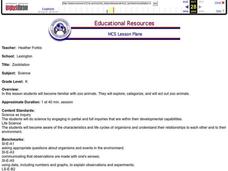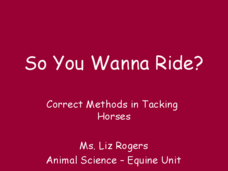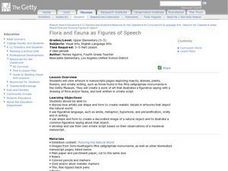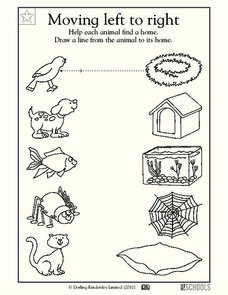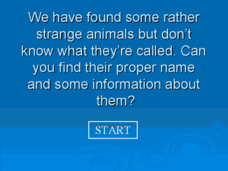Curated OER
Cute, Colored and Contentious
Whether your class responds to the blog linked to this article, or just answers the nine related questions, they're in for an eye-opening read. Pupils consider animal rights as they read a New York Times article about two men who have...
Curated OER
Introduce Vocabulary: Animal Tracks (Dorros)
What kind of animal made those tracks? Explore some wild vocabulary in context as learners listen to Arthur Dorros' book, Animal Tracks. Before your read this, introduce the new words like bother, dam, reed,...
Curated OER
Zoobilation
Youngsters become familiar with zoo animals. They sort them into categories, and choose an animal to act out. Two zoo centers are created in the classroom that have examples of the animals for the pupils to play with. Then, they choose...
Curated OER
Friends on the Farm
Young farmers explore the world of farm animals. They are introduced to a variety of animals, what their role is, how many legs they have, and what sounds they make. Worksheets and websites embedded in the plan are used to carry it out....
Curated OER
The Reformers: Martin Luther and César Chávez
Kids consider the characteristics needed to be reformers like Martin Luther King and Cesar Chavez. They read a series of quotes focused on both animal and human rights to answer eight critical thinking questions.
Curated OER
Pet Guess Who
Est-ce que ton animal grand ou petit? Pair up your beginning French speakers for a game of Pet Guess Who! Using pet advertisements from newspapers or the Internet, pairs try to guess what kind of animal their partner has. Also, use the...
Curated OER
Fossil Formation
A fossil is worth a thousand words! Individuals craft their own amber fossil of an insect in addition to molds and casts of seashells. A third activity takes the lesson a notch higher: Learners measure stride lengths between tracks and...
Curated OER
Build a Coral Polyp
Students build a coral polyp out of a banana, straw, oyster crackers, sprinkles, and more. In this coral polyp lesson plan, students also list the differences between plants and animals.
Curated OER
So You Wanna Ride?
Get ready to saddle up! Novice riders view diagrams to see the differences between English and Western saddles and bridles. They then learn the steps to saddling and bridling a horse and review safety instructions. Finally, it's riders up!
Curated OER
Who am I?
Here is a worksheet that allows students to see a picture of an animal and clearly identify it. The pictures are clear and colorful. All of the 16 animals pictured are mammals. This would be a terrific worksheet to use with...
Curated OER
Animales de la granja
Yee-haw! Welcome to the farm. Your young Spanish language learners match six animals to their Spanish translation. After they complete it, gather the class together, make the sound of one of the animals, and have the kids identify the...
Curated OER
Learning to Resist: Watercolor
Consider wax resist drawings as a way to bridge art and science. Learners view, discuss, and practice drawing insects or animals using waxy crayons. They pay attention to the creature's features as they create images with watercolor and...
Curated OER
Flora and Fauna as Figures of Speech
What a lovely way to incorporate artwork into your language arts lesson. View artwork in illustrated manuscript pages, depicting insects, animals, plants, flowers, and ornate writing in the Getty Museum. Practice using figurative...
Curated OER
Bringing Animal Issues into the Classroom: César Chávez
Fifth graders get critical and political while they begin thinking about human and animal rights in relation to the US Constitution. This hand out includes answers to several questions regarding Cesar Chavez and his work to secure rights...
Curated OER
Moving Left to Right
These animals need to find their homes! Young scholars help them by drawing lines from each animal on the left to its habitat on the right. There is no guessing to be done here, though; pairs are directly across from one another. They...
Curated OER
Skulls Tell It All
Skulls tell it all, and with this lesson plan, you will tell it all to your class! Youngsters view animal skulls, analyzing the shape of teeth and the placement of the eye sockets. They associate these adaptations with the types of food...
Curated OER
Animal Flashcards
Print, cut, and color these flashcards! Your young learners will love learning the Spanish words for their favorite animals! There are 24 flashcards included.
Curated OER
Label The Farm Animals
Your youngest Spanish learners will love coloring these fun, farmyard friends! They learn the words for rooster, pig, horse, donkey, sheep, duck, chicken, goat, and cow. Next, they color a picture of each animal and practice writing the...
Curated OER
Growing Minds: Farm Animal Matching Game
Use this farm animal matching worksheet alongside the Growing Minds Farm Animals lesson; kids learn about different animals and the products they are needed for. This activity highlights cows, bees, geese, chickens, goats, sheep, and...
Curated OER
Go To Sleep, Gecko!
Second graders examine the interdependence of organisms using the book "Go To Sleep, Gecko!" They examine a variety of food chains, listen to the book, and answer story comprehension questions. Students then conduct research on food...
Curated OER
Who Wants to be a Millionaire: Teeth
What kind of teeth do alligators have? Find out as you play a quiz game all about teeth. There are 15 questions all related to how various animals eat, swallow, and chew with their chompers.
Curated OER
Animal Skulls
Pictures of different animal skulls make this slide show fascinating. The intent is to display the differences in structure among herbivores, carnivores, and omnivores. If you do not have animal skull replicas, this presentation would be...
Curated OER
A Cow's Life
Moo! An engaging two-part worksheet focuses on the role of cows in our agriculture system. The second part of the worksheet has ten discussion questions, which should lead to some interesting points about cows. Young farmers can learn...
Curated OER
Classify Animals
Give your class an idea of how animals are classified by scientists with this interactive PowerPoint activity. They are presented with six different animals, they answer yes or no questions until only one animal remains alongside...




